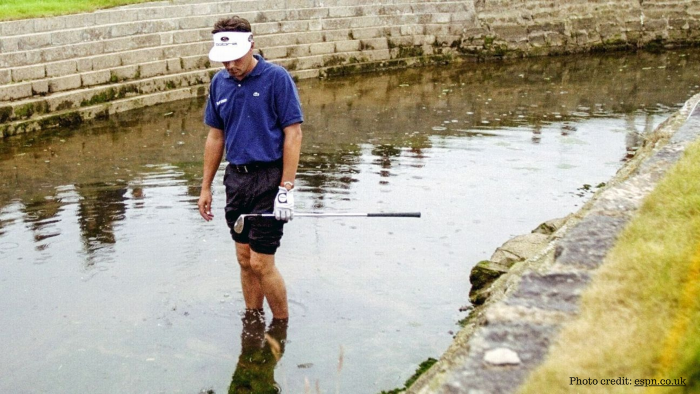The concept of ‘choking’ is one familiar to many sportspeople – that sudden catastrophic drop in performance when placed in a pressurised situation, either from before the game/event actually starting, or kicking in during the event game/event itself. This ‘choking’ phenomenon is often seen by teams and athletes even from a dominant or winning position.
There are many theories as to what causes choking in sport, but most stem from the effects of varying degrees of anxiety and/or pressure that the player perceives they are being placed under. The player becomes distracted, muscles tighten up, focus is directed toward the wrong areas, and thoughts quickly turn negative.
There have been a number of famous ‘sporting chokes’ from winning positions in history.

Some of the more famous include golfer Jean Van de Velde’s final hole collapse in the 1999 British Open, Newcastle United’s (and their manager’s) drastic crash in form after Christmas in the 1995/96 English Premier League Season having once led eventual champions Manchester United by 10 points, and tennis player Jana Novotna’s catastrophic loss of composure at 4-1 and serving game point up against Steffi Graf in the 1993 Wimbledon Final – Novotna fell apart and lost the match in just 10 further minutes.
There are of course many more examples of sportspeople of all standards reporting that their performance just didn’t reach an expected level during a competitive match, or where struggling to achieve the same heights under a pressurised competitive situation as they have in a more relaxed training atmosphere.
Squash can be an especially unforgiving sport for those prone to the dreaded choke.
The nature of players being shut in such a small playing area, battling shoulder to shoulder with their opponent, and with spectators gazing down from the balcony above, all magnify that perceived pressure some players experience.
Sian Beilock, an associate professor in the Department of Psychology at the University of Chicago, wrote an excellent book called ‘Choke: What the Secrets of the Brain Reveal about Getting It Right When You Have to‘, that is well worth a look for anyone interested in reading up more about the subject. Beilock is a leading expert on cognitive science and the many factors involved that influence all types of performance, and there are some fascinating insights in her book.
An interesting paper from 2012, offers a novel approach to solving the ‘choking’ dilemma. The study, published in the “Journal of Experimental Psychology: General”, has suggested that right-handed athletes who squeezed a ball in their left hand before competing, were less likely to choke under pressure than right-handed athletes who squeezed a ball in their right hand (interestingly, the effect isn’t believed to exist in left-handed players due to reasons relating to relationships between different parts of the brain being less clear-cut in lefties).
While this may sound pretty far-fetched, lead researcher Juergen Beckmann offers some interesting theories as to the mechanism behind the effect that they demonstrated in experiments across several sports. Beckmann discusses the effects of activation of the different hemispheres of the brain and goes on to discuss other potential applications of his research.
The Science Daily website has a write up with further information here, and the original study abstract ‘Preventing Motor Skill Failure Through Hemisphere-Specific Priming: Cases From Choking Under Pressure‘ can be found here.
So is clenching your fist and/or squeezing a ball for a couple of minutes before entering the court going to be the answer to negating the effects of pressure and the dreaded choke before your next big squash match?
More research is definitely needed to confirm this quirky phenomenon, but it certainly won’t hurt to give it a try!
Gary Nisbet
B.Sc.(Hons), CSCS, NSCA-CPT, Dip. FTST
SquashSkills Fitness & Performance Director
Watch: A Guide To Mental Preparation - With Peter Nicol
In this series with the legend Peter Nicol, he takes us through the mental preparation needed to succeed and stay focused when building up to a match.
Watch now